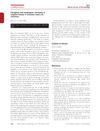 29 citations,
February 2016 in “International Journal of Dermatology”
29 citations,
February 2016 in “International Journal of Dermatology” People with lichen planus are more likely to have dyslipidemia, especially higher triglyceride levels.
 26 citations,
August 2014 in “Genetic Testing and Molecular Biomarkers”
26 citations,
August 2014 in “Genetic Testing and Molecular Biomarkers” High levels of TNF-α may contribute to obesity and insulin resistance in PCOS, but not due to the C850T genetic variation.
 19 citations,
March 2018 in “Expert Opinion on Drug Safety”
19 citations,
March 2018 in “Expert Opinion on Drug Safety” Most treatments for spondyloarthritis are safe, but monitoring and careful selection based on patient risks are important.
 18 citations,
January 2013 in “Postepy Dermatologii I Alergologii”
18 citations,
January 2013 in “Postepy Dermatologii I Alergologii” Puberty often causes skin issues like acne and excessive sweating, and treatments require patience as results may vary.
 17 citations,
June 2010 in “Journal of Cosmetic Dermatology”
17 citations,
June 2010 in “Journal of Cosmetic Dermatology” Many women with hard-to-treat acne also have PCOS.
 15 citations,
July 2019 in “Lasers in surgery and medicine”
15 citations,
July 2019 in “Lasers in surgery and medicine” The erbium-glass laser effectively promotes hair regrowth in alopecia areata.
 7 citations,
July 2019 in “International journal of research in dermatology”
7 citations,
July 2019 in “International journal of research in dermatology” Intralesional triamcinolone acetonide is more effective than platelet-rich plasma for treating scalp alopecia areata.
 6 citations,
January 2017 in “Dermato-endocrinology”
6 citations,
January 2017 in “Dermato-endocrinology” ADT-G may be a useful indicator of increased androgen levels in women with acne and can be lowered with certain birth control pills.
 5 citations,
September 2022 in “Research Square (Research Square)”
5 citations,
September 2022 in “Research Square (Research Square)” CD201+ fascia progenitors are essential for wound healing and could be targeted for treating skin conditions.
 3 citations,
January 2018 in “Postępy Dermatologii i Alergologii”
3 citations,
January 2018 in “Postępy Dermatologii i Alergologii” Longer TA repeats in the SRD5A2 gene may increase acne risk in Chinese people.
 1 citations,
May 2017 in “InTech eBooks”
1 citations,
May 2017 in “InTech eBooks” Some natural remedies may help with hair regrowth, but more research is needed to confirm their effectiveness and safety.
 December 2023 in “Journal of nutritional science and vitaminology”
December 2023 in “Journal of nutritional science and vitaminology” A zinc-deficient diet stunted growth and affected organs in mice, with C57BL/6J mice showing more severe symptoms.
 February 2023 in “Research Square (Research Square)”
February 2023 in “Research Square (Research Square)” Genetic testing confirmed a rare skin disorder in a young girl, which improved with zinc supplementation.
 June 2022 in “Journal of the Liaquat University of Medical and Health Sciences”
June 2022 in “Journal of the Liaquat University of Medical and Health Sciences” People with lichen planus are more likely to have abnormal blood fats than healthy people.
 August 2017 in “International journal of research in dermatology”
August 2017 in “International journal of research in dermatology” 0.05% betamethasone dipropionate is the most effective treatment for mild alopecia areata.
 July 2021 in “British Journal of Dermatology”
July 2021 in “British Journal of Dermatology” Low testosterone levels may contribute to female pattern hair loss in men.
 September 1997 in “Journal of The European Academy of Dermatology and Venereology”
September 1997 in “Journal of The European Academy of Dermatology and Venereology” New treatment improves male hair loss.
 113 citations,
July 2020 in “Communications biology”
113 citations,
July 2020 in “Communications biology” Men, especially older ones with health issues like prostate cancer, may have worse COVID-19 outcomes and could benefit from therapies targeting male hormones.
 66 citations,
February 2015 in “Cell & tissue research/Cell and tissue research”
66 citations,
February 2015 in “Cell & tissue research/Cell and tissue research” The document concludes that there are no effective clinical treatments for hearing loss due to hair cell damage, but research is ongoing.
 62 citations,
August 2014 in “BMC Endocrine Disorders”
62 citations,
August 2014 in “BMC Endocrine Disorders” New findings explain how genetic changes, body clocks, and certain molecules affect tissue response to stress hormones.
 10 citations,
August 2021 in “Journal of Cosmetic Dermatology”
10 citations,
August 2021 in “Journal of Cosmetic Dermatology” Most patients with telogen effluvium had low iron and vitamin D levels; iron supplements were commonly prescribed.
 4 citations,
November 2020 in “BMC Dermatology”
4 citations,
November 2020 in “BMC Dermatology” Researchers identified genes in scalp hair follicles that may affect hair traits and hair loss.
 3 citations,
May 2018 in “Experimental Dermatology”
3 citations,
May 2018 in “Experimental Dermatology” Young HS patients often have other physical and mental health issues, and research on HS covers a wide range of topics including genetics, triggers, treatments, and the need for more data.
 1 citations,
May 2023 in “Prospects in Pharmaceutical Sciences”
1 citations,
May 2023 in “Prospects in Pharmaceutical Sciences” New cytokine-targeted therapies show promise for treating alopecia areata.

PCOS patients, especially obese ones, often lack vitamin D and may need supplements and lifestyle changes.
 December 2023 in “Communications biology”
December 2023 in “Communications biology” Targeting the HEDGEHOG-GLI1 pathway could help treat keloids.
 June 2020 in “Journal of Investigative Dermatology”
June 2020 in “Journal of Investigative Dermatology” Tiny particles from skin cells can help activate hair growth.
 November 2019 in “Harper's Textbook of Pediatric Dermatology”
November 2019 in “Harper's Textbook of Pediatric Dermatology” The document is a detailed medical reference on skin and genetic disorders.
 April 2018 in “Journal of Investigative Dermatology”
April 2018 in “Journal of Investigative Dermatology” Minoxidil didn't significantly increase hair growth in minipigs.
 December 2017 in “British Journal of Dermatology”
December 2017 in “British Journal of Dermatology” Targeted therapy for skin cancer is complex due to the role of the hedgehog pathway in both cancer and hair growth.






























